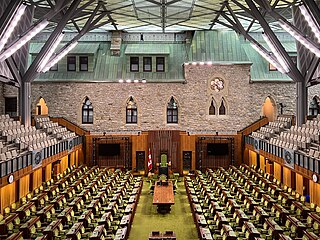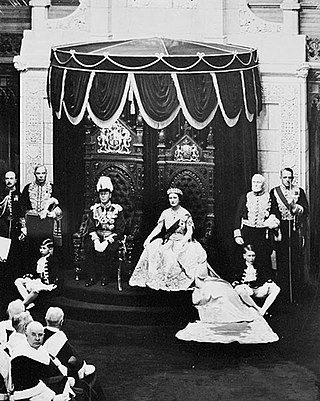
The House of Lords is the upper house of the Parliament of the United Kingdom. Like the lower house, the House of Commons, it meets in the Palace of Westminster in London, England. One of the oldest institutions in the world, its origins lie in the early 11th century and the emergence of bicameralism in the 13th century.

The Parliament of the United Kingdom of Great Britain and Northern Ireland is the supreme legislative body of the United Kingdom, and may also legislate for the Crown Dependencies and the British Overseas Territories. It meets at the Palace of Westminster in London. Parliament possesses legislative supremacy and thereby holds ultimate power over all other political bodies in the United Kingdom and the Overseas Territories. While Parliament is bicameral, it has three parts, consisting of the sovereign (King-in-Parliament), the House of Lords, and the House of Commons. In theory, power is officially vested in the King-in-Parliament. However, the Crown normally acts on the advice of the prime minister, and the powers of the House of Lords are limited to only delaying legislation; thus power is de facto vested in the House of Commons.

The Bill of Rights 1689 is an Act of the Parliament of England that set out certain basic civil rights and clarified who would be next to inherit the Crown. It remains a crucial statute in English constitutional law.

The House of Representatives is the lower house of the bicameral Parliament of Australia, the upper house being the Senate. Its composition and powers are established in Chapter I of the Constitution of Australia.

The House of Commons of Canada is the lower house of the Parliament of Canada. Together with the Crown and the Senate of Canada, they comprise the bicameral legislature of Canada.

The Parliament of Canada is the federal legislature of Canada, seated at Parliament Hill in Ottawa, and is composed of three parts: the King, the Senate, and the House of Commons. By constitutional convention, the House of Commons is dominant, with the Senate rarely opposing its will. The Senate reviews legislation from a less partisan standpoint and may initiate certain bills. The monarch or his representative, normally the governor general, provides royal assent to make bills into law.
A question time in a parliament occurs when members of the parliament ask questions of government ministers, which they are obliged to answer. It usually occurs daily while parliament is sitting, though it can be cancelled in exceptional circumstances. Question time originated in the Westminster system of the United Kingdom, and occurs in other countries, mostly Commonwealth countries, who use the system.
Acts of Parliament, sometimes referred to as primary legislation, are texts of law passed by the legislative body of a jurisdiction. In most countries with a parliamentary system of government, acts of parliament begin as a bill, which the legislature votes on. Depending on the structure of government, this text may then be subject to assent or approval from the executive branch.

Royal assent is the method by which a monarch formally approves an act of the legislature, either directly or through an official acting on the monarch's behalf. In some jurisdictions, royal assent is equivalent to promulgation, while in others that is a separate step. Under a modern constitutional monarchy, royal assent is considered little more than a formality. Even in nations such as the United Kingdom, Norway, the Netherlands, Liechtenstein and Monaco which still, in theory, permit their monarch to withhold assent to laws, the monarch almost never does so, except in a dire political emergency or on advice of government. While the power to veto by withholding royal assent was once exercised often by European monarchs, such an occurrence has been very rare since the eighteenth century.

The Parliament of Australia is the supreme legislative branch of the government of Australia. It consists of three elements: the monarch, the Senate and the House of Representatives. The combination of two elected chambers, in which the members of the Senate represent the states and territories while the members of the House represent electoral divisions according to population, is modelled on the United States Congress. Through both chambers, however, there is a fused executive, drawn from the Westminster system.
In the United Kingdom, representative peers were those peers elected by the members of the Peerage of Scotland and the Peerage of Ireland to sit in the British House of Lords. Until 1999, all members of the Peerage of England held the right to sit in the House of Lords; they did not elect a limited group of representatives. All peers who were created after 1707 as Peers of Great Britain and after 1801 as Peers of the United Kingdom held the same right to sit in the House of Lords.
Parliamentary privilege is a legal immunity enjoyed by members of certain legislatures, in which legislators are granted protection against civil or criminal liability for actions done or statements made in the course of their legislative duties. It is common in countries whose constitutions are based on the Westminster system.
A casting vote is a vote that someone may exercise to resolve a tied vote in a deliberative body. A casting vote is typically by the presiding officer of a council, legislative body, committee, etc., and may only be exercised to break a deadlock.

The Parliament of The Bahamas is the bicameral national parliament of the Commonwealth of The Bahamas. The parliament is formally made up of the sovereign, an appointed Senate, and an elected House of Assembly. It currently sits at the Bahamian Parliament Building in Nassau, the national capital.
The committees of the Australian Senate are committees of Senators, established by the Australian Senate, for purposes determined by that body. Senate committees are part of the operation of the Australian parliament, and have for some decades been involved in maintenance of government accountability to the Australian parliament, particularly through hearings to scrutinise the budget, and through public inquiries on policy questions.

The Disqualifications Act 2000 is an Act of the Parliament of the United Kingdom. It gained royal assent on 30 November 2000. The Act extends a privilege to Ireland whereby persons elected to sit in its houses of parliament are eligible, if elected/appointed, to sit in a house of the parliament of the United Kingdom also. This privilege is extended to all countries in the Commonwealth of Nations.
In countries with a parliamentary system of government, contempt of Parliament is the offence of obstructing the legislature in the carrying out of its functions, or of hindering any legislator in the performance of his duties.

The National Assembly of Thailand is the bicameral legislative branch of the government of Thailand. It convenes in the Sappaya-Sapasathan, Dusit District, Bangkok.

Erskine May is a parliamentary authority originally written by British constitutional theorist and Clerk of the House of Commons, Thomas Erskine May.
A joint committee of the Parliament of the United Kingdom is a joint committee of the Parliament of the United Kingdom, formed to examine a particular issue, whose members are drawn from both the House of Commons and House of Lords. It is a type of Parliamentary committee of the United Kingdom.










